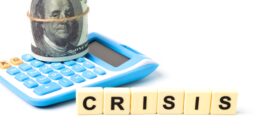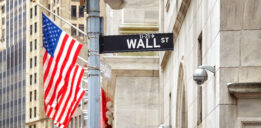Another Financial Crisis Looms as World Marks 10th Anniversary of the Lehman Bros. Collapse
The tenth anniversary of Lehman Brothers Holdings Inc. filing for bankruptcy on September 15, 2008 approaches. It was the biggest bankruptcy in recorded history and it triggered the biggest financial crisis since the Great Depression.
Has Wall Street learned its lesson? The answer is a flat “no.”
It seems that others are vying to beat that dubious record because another bank—or group of banks—has accumulated astonishing amounts of derivatives leverage since 2008. They are overleveraged in derivatives.
It’s as if Lehman Brothers’ collapse and the millions of jobs lost and savings gone up in smoke have taught us nothing.
Derivatives Remain “a Thing”
The five top American banks have continued to operate in the murky world of derivatives. Aite Group, LLC calculates that as of December 31, 2017, the top five banks held about $157.0 trillion in derivatives.
That’s at least 10% more than they did in 2008. And if that’s not dramatic enough, $157.0 trillion is equal to twice the 2016 global gross domestic product (GDP) of about $75.0 trillion. (Source: “Global GDP (gross domestic product) at current prices from 2010 to 2022 (in billion U.S. dollars),” Statista, last accessed August 31, 2018.)
Citigroup Inc (NYSE:C) owns the largest amount of derivatives among U.S. banks at some $45.0 trillion. But, not to be outdone, the Germans over at Deutsche Bank AG (NYSE:DB) have as much as $64.0 to $70.0 trillion in credit default swaps (CDS) derivatives. That’s about the size of the world’s economy. (Source: “Is It Time To Panic About Deutsche Bank?,” ZeroHedge, February 3, 2016.)
These Numbers Should Make You Uncomfortable
Just as in 2008, all it takes is a single error (or perhaps someone observing that Deutsche Bank’s new strategy of focusing on Europe puts it on a direct collision course with a eurozone “black swan” scenario) to trigger a global financial crisis. (Source: “Falling Deutsche Bank shares reignite ‘black swan’ worries,” MarketWatch, June 2, 2018.)
The obvious question might be: why would bankers fail to consider, let alone appreciate, the risks that they are taking with other people’s money—perhaps some of it yours? Such is the nonchalance that triggers a financial crisis.
And the troubling numbers associated with the derivatives fail to describe the whole picture.
The Big Banks Are Just the Most “Transparent” Derivative Holders
Myriad smaller institutions and counterparties have spread the risk of these instruments to the population at large.
The derivatives game has moved past the exclusive “Casino Royale” high-stakes poker scenario. More pedestrian “online” players have also been permitted to join.
Few win and many more lose, literally. Consider that municipal governments in the United Kingdom tried to use derivatives in the 1990s to maximize their public finances until the practice was banned due to excessive risk.
Italy borrowed the model, upping the ante and getting into significant trouble in the process. (Source: “Finance: An Exposed Position,” Financial Times, last accessed August 31, 2018.)
In the United Kingdom, a judge ordered a ban on banks’ and municipal governments’ interest rate swap agreements. In Italy, judges adopted a similar decision—in 2013.
Likewise, in 2007, there were those who denounced the risks that the speculative bubble was about to burst. Few noticed, even if the financial crisis, which started in 2007 in the U.S., would end up affecting the world economy for a long time.
2008 Financial Crisis Effects Are Still with Us Today
Most students of the 2007/2008 financial crisis agree that its cause was an excess of debt, accumulated through the widespread use of high-risk mortgage (sub-prime) transactions and a related expansion of speculation.
That speculation includes, among other “instruments,” the now infamous over-the-counter (OTC) derivatives. These are the kind that buyers can “acquire” beyond the official and regulated markets, escaping the latter’s attention and rules. (Source: “After Lehman, banks aren’t as safe as they think,” Gulf News, August 17, 2018.)
Could It Happen Again?
The crisis has passed in market performance terms. Stock valuations are at record highs and, in many cases, they have surpassed logical expectations. Since 2009, the world’s main financial markets have experienced the longest bull run in history.
Yet, neither the real economy nor the conditions that produced the financial crisis in the first place have managed to achieve any kind of insurance against market risk.
Regulators were supposed to have enforced mechanisms to exercise greater control over derivatives, especially the OTC variety.
Yet, few have managed to navigate the murky waters of financial engineering. There’s a $600.0-trillion mystery to resolve. (Source: “Decade after Crisis, a $600 Trillion Market Remains Murky to Regulators,” The New York Times, June 22, 2018.)
Dodd-Frank
President Barack Obama approved the Dodd-Frank Wall Street Reform and Consumer Protection Act in 2010.
It was intended to give regulators a greater ability to control derivatives trading. But regulations in banking and finance often tend to produce the opposite effect of their stated purpose.
Prohibition in the 1920s led to higher demand for alcohol and the emergence of highly profitable organized crime syndicates.
Dodd-Frank, like other similar laws, simply made legal what was shady or borderline illegal.
Thus, while the law demanded that U.S. banks become more transparent about their derivatives activity by reporting trades and their specifics to the Commodity Futures Trading Commission (CFTC), they were not obliged to disclose derivative holdings kept in offshore entities. (Source: Ibid.)
That’s one of the reasons why Deutsche Bank, perhaps the largest derivatives trader operating outside the U.S. market, has been able to continue offering derivatives with little or no U.S. disclosure.
The Commodity Futures Trading Commission wanted to seal the loophole, enforcing a new rule that would have demanded that subsidiaries of U.S. banks disclose their entire derivatives exposure, while subjecting these banks to a new set of financial regulations aimed at reducing their profits—and incentives.
What Are Derivatives?
Derivatives, as their name hints, are financial products whose value is “derived” from another asset, which can be anything from a stock to a bond.
In simpler terms, consider a derivative to be little more than a bet on the outcome of a future event or the future price of a commodity or asset.
In more pedestrian practice, a derivative is little different than a bet at a horse race—or an illegal boxing match. The idea has been to cover risks. For example, if I go long on a stock, I may purchase a derivative on that same stock, betting the price drops to hedge my bets.
Derivatives Are Bets
But, more typically, derivatives are bets on the future price of a given commodity.
Whereas, at first—even before the use of the term derivative—a baker may have locked in a price for flour, for a specific period of time, to facilitate his accounting of the purchase price of wheat per kilo. The modern derivative does not feature an exchange of goods.
It’s not the baker who buys the wheat in a derivative; rather, it’s the financial speculator.
In the space of 20 years, the derivatives market has involved hundreds of trillions’ worth of transactions.
The reason derivatives can cause another crash is that the speculation that surrounds them has affected the price of hundreds of commodities.
The people involved in producing the commodity, wheat or whatever else, have no influence in deciding the price.
In other words, derivatives represent the most arrogant face of the modern stock market, one that encourages an ever greater gap between the real and the make-believe economy of financial manipulation.
That’s why, in a stock market crash situation, the real economy is always so ready to implode.






